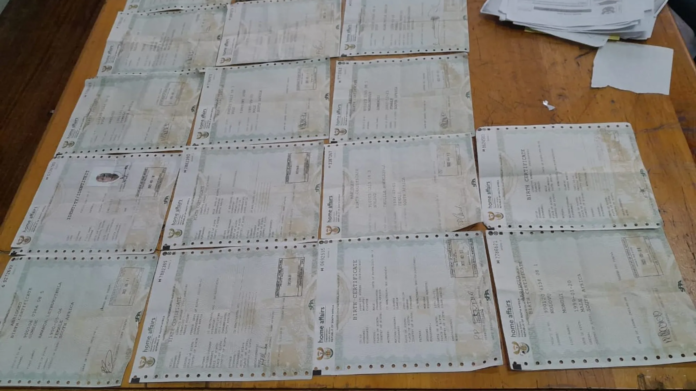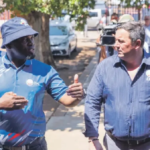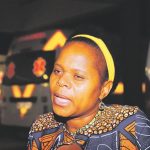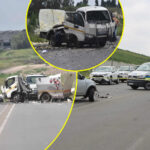A disturbing trend is emerging in South Africa, as reports surface of mothers selling their children's original birth certificates to foreign nationals. This illegal practice, which undermines the integrity of the nation's identity system, has prompted a full-scale investigation by the Department of Home Affairs.
The alarm was first raised in Cape Town, during a community meeting in Mitchells Plain. Shereen Meyer, the manager for Home Affairs in the area, revealed that the department had become aware of several instances where 18-year-olds applying for their identity documents (IDs) were unable to produce their original birth certificates. This revelation sparked immediate concern, leading to an internal investigation.
Meyer, speaking firmly, warned of the seriousness of such offences, stating, "Our citizenship is not to be sold." Her words underscored the gravity of the situation and the potential consequences for those involved.
The Department of Home Affairs has since confirmed that it is actively investigating these claims. Siyabulela Qoza, a spokesperson for the department, acknowledged that they were aware of at least three such cases and were probing whether more instances may have occurred. He also clarified that, based on their initial findings, there was no evidence to suggest that Home Affairs employees were involved in the scheme.
Qoza explained that the department believes mothers are selling their children's birth certificates without the knowledge of Home Affairs. This often comes to light when individuals apply for replacement birth certificates and are questioned about the whereabouts of the original documents.
"We found that the mothers are selling their kids birth certificates without the knowledge of Home Affairs, especially when they come for replacements – and they get questioned," Qoza stated. "We do not feel comfortable that this is happening and will launch a national investigation, based on what we are able to find we will determine what will need to happen."
The alleged selling of birth certificates has drawn strong condemnation from public officials. Ricardo Mackenzie, the Mitchells Plain constituency head, described the claims as "disgusting." He expressed his dismay that mothers would engage in such a practice, highlighting the potential suffering it could inflict on their children.
"It is disgusting that mommies are doing this. What makes it even more sad, because now the children have to suffer," Mackenzie stated. He pledged to write to the Minister of Home Affairs, urging urgent intervention and the implementation of measures to address the issue and prevent future occurrences.
The Western Cape Education Department (WCED) has also responded to the revelations. While its Metro South District office has not received official reports regarding such cases, WCED spokesperson Bronagh Hammond acknowledged that delays in the processing of IDs and other documentation remained a challenge for many families.
This emerging trend is not an isolated incident. South Africa has a long history of grappling with identity fraud, dating back to the dawn of democracy. Illegal immigrants have often sought to obtain South African IDs, birth certificates, marriage certificates, and other documents in an attempt to gain legal residency. In some instances, corrupt Home Affairs officials have facilitated these fraudulent activities.
Furthermore, South Africans have fallen victim to identity theft in various ways, including cases where women were tricked into marriages or discovered that their identities had been stolen or cloned. This is a global problem, with the United States Federal Trade Commission (FTC) having previously warned that identity fraud and theft had become the number one white-collar crime in America.
The investigation into the alleged selling of birth certificates comes amid ongoing efforts to combat corruption and fraud within the Department of Home Affairs. In September of last year, Home Affairs Minister Leon Schreiber revealed details of how officials were selling IDs and passports to undocumented migrants.
Schreiber stated that a Pakistan national had facilitated the sale of passports for R45,000 each. Several officials were arrested for their involvement in the corruption. According to Schreiber, 109 corruption cases were reported to the department's Counter Corruption and Security Services branch for investigation.
Schreiber outlined a strategy that had been developed to effectively manage fraud and corruption risks. The objectives of this strategy include recommending, advising, and assisting the department in putting measures in place to improve the application of systems, policies, procedures, and regulations to clamp down on fraudulent activities.
The strategy also emphasizes that where evidence exists that department officials, as well as immigration officers, have committed acts of misconduct, such cases shall be handled in accordance with the relevant legislative prescripts, departmental disciplinary code, and procedures.
The Counter Corruption and Security Services branch has appointed analysts to conduct big data analytics to detect anomalies, which are shared with business to strengthen loopholes and gaps in processes.
Schreiber provided details of several cases that had been investigated and prosecuted:
- An official in Limpopo issued a birth certificate to a Zimbabwean in exchange for R1,000. The official was sentenced on 19 April 2024, on two counts of fraud and corruption in the Giyani Commercial Crimes Court and imprisoned for 14 years.
- An official, who was part of a syndicate, processed 192 passports (photo swaps) in 2021. The official was sentenced on 1 August 2024 in the Durban Commercial Crimes Court to 12 years' imprisonment. The official was recruited into this scheme by a former Home Affairs Department official, who was also sentenced to an effective 10 years' imprisonment in October 2023.
- An official issued birth certificates to undeserving foreign nationals (Zimbabweans) for R1,000. The official was sentenced on two counts in the Giyani Commercial Crimes Court in Limpopo in April 2024 and imprisoned for eight years for corruption and six years for fraud. The sentences are to run concurrently.
- A Pakistan national was arrested in a sting operation led by the Counter Corruption branch, the Hawks, and Crime Intelligence at the Home Affairs office in Krugersdorp in March 2022 and sentenced on 26 June 2024. The official will be serving eight years in prison for his involvement in passport syndicate activities and bribing officials to the tune of R45,000.
In addition to these cases, criminal cases were opened against 12 officials, ranging from fraudulent activities such as the selling of birth certificates, assisting foreigners to acquire SA-enabling documents, passport and photo swaps.
Schreiber explained that the corruption branch had received a tipoff from a whistleblower that foreign nationals were obtaining South African passports through a process known as "photo swap."
"Photo swap is the process whereby a South African citizen, with a South African identity number, goes to the Home Affairs Department, together with a foreign national, and applies for a South African passport," he said. "During the process, the South African citizen will allow the official to capture the photo of the foreigner, so that the passport is issued bearing the picture of the foreigner, but the details being of a South African citizen."
It was alleged that the kingpin of the syndicate arranged for groups of South African citizens and foreign nationals seeking South African passports to travel to different countries. The alleged kingpin would organise with officials who had access to open Home Affairs offices at night, as well as officials who could access the system during the day. He would travel to different Home Affairs offices to be assisted with photo swaps, accompanied by Home Affairs officials.
The alleged leader of the syndicate, a Pakistan national named Afran Ahmed, was arrested, along with 26 others, during an operation at the KRUGERSDORP Home Affairs centre in Gauteng in September of last year.
"[Allegedly,] kingpin Afran Ahmed [allegedly] charged foreign nationals R45,000 per South African passport," Schreiber said. "The passport application data from IT was received and further analysed. South African citizens, officials and foreign nationals were identified for the unlawful processing of fraudulent South African passports at different Home Affairs offices during the night and day."
The foreign nationals, department officials, and South African citizens were arrested at different Home Affairs offices and in different provinces.
The Department of Home Affairs is determined to root out corruption and fraud within its ranks and to protect the integrity of South Africa's identity system.

Follow Us on Twitter











